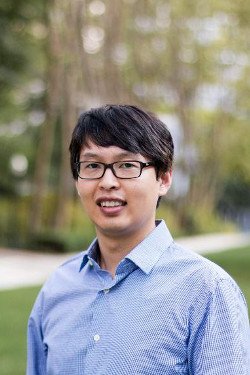Eunyong Park
2017 Regional Award Finalist — Post-Doc

Current Position:
Postdoctoral Fellow
Institution:
The Rockefeller University
Discipline:
Biophysics and Structural Biology

Current Position:
Postdoctoral Fellow
Institution:
The Rockefeller University
Discipline:
Biophysics and Structural Biology
Recognized for: Resolving a long-standing question about the structure and function of the CLC family of proteins, a group of channels which transport chloride ions across the cell membrane.
Areas of Research Interest and Expertise: biochemistry, structural biology, biophysics, membrane transport proteins
Biography:
PhD, Biochemistry, Harvard Medical School
MS, Biochemistry, Seoul National University, South Korea
BS, Chemical Engineering, Seoul National University, South Korea
Membrane transport proteins allow passage of ions and other molecules and proteins between the inside and outside of cells. Throughout his career, Dr. Park has sought to visualize membrane transport proteins, leading to important insights into their function. Dr. Park has turned his expertise toward understanding the CLC proteins, a group of channels that pass chloride ions across the cell membrane. There are two types of CLC proteins: passive channels that let chloride ions flow into the cell, and active channels that move chloride ions into the cell by exchanging chloride ions for protons. Generally, passive and active channels have different structures, however the CLC family uses the same structure to perform the two different functions. Given their similar shape, it remained a mystery why the two types of channels operate differently. Dr. Park used a technique called cryo-electron microscopy to identify distinctive features that explain the differences between passive and active channels, solving this long-standing conundrum.
Dr. Park's long-term goal is to uncover the structure and function of membrane transport proteins that are important for human physiology, in order to improve human health and advance our understanding of these fundamental processes.
“Membrane-bound channels and transporters mediate many essential physiological processes including electrical signaling of cells and transport of nutrients and electrolytes across cell membranes. My goal is to elucidate their molecular mechanisms to advance our fundamental knowledge of biology and improve human health.”
Website:
https://mcb.berkeley.edu/faculty/BBS/parke
Key Publications:
Other Honors:
2016 Charles H. Revson Senior Postdoctoral Fellowship in Biomedical Science
2014 ASCB Kaluza Award (2nd place winner) American Society for Cell Biology (ASCB)
2013-2016 Jane Coffin Childs Memorial Fund Postdoctoral Fellowship
2013 Damon Runyon Postdoctoral Fellowship (declined)
In the Media:
http://www.jccfund.org/blog/change-chloride-ion-channel-structure-influences-function/
http://www.ascb.org/ascb-post/serving-in-the-korean-military-kaluza-winner-eunyong-park-had-time-to-change-his-mind/